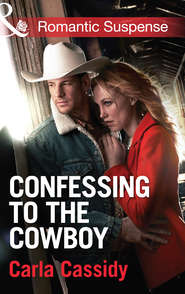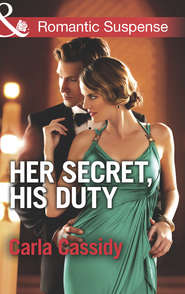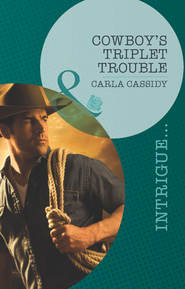По всем вопросам обращайтесь на: info@litportal.ru
(©) 2003-2024.
✖
Imminent Danger
Автор
Год написания книги
2018
Настройки чтения
Размер шрифта
Высота строк
Поля
“No, the blindness is real, but there’s no physical reason for it. It’s psychosomatic. Hysterical blindness is what the doctors call it.” She couldn’t help the anger that sharpened her tone.
She was sorry she’d brought it up. The whole thing made her feel weak, stupid and crazy. And now he would think she was weak, stupid and crazy.
“This happened at the same time as whatever happened that put you in protective custody?” he asked softly.
She nodded. “I’ve been blind for a month. The doctors say my sight could return at any time.” They’d also said it was possible it might never return, but she refused to consider that possibility.
He remained silent and she continued. “I just thought you should know. I haven’t had time to adjust much, so I’m not what you’d consider a high-functioning blind person.” She couldn’t help the bitterness, the slight ache of the unfairness of it all that colored her voice. “But we won’t tell your friends that not only did you have the misfortune of falling in love with a blind woman, but a crazy one, as well.”
There was another long pause. “Self-pity isn’t very becoming.”
His words hung in the air for a long moment, and for that singular moment, she couldn’t believe he’d had the audacity to accuse her of self-pity. What did he know about her life, about her?
Anger, swift and self-righteous, suddenly filled her. She stood, allowing the anger free reign. “How dare you!” she exclaimed. She glared in the direction she thought he stood. “You aren’t the one who has lost everything. You have no idea what I’ve been through…what I’m continuing to go through.”
Somewhere in the back of her mind, she knew she was overreacting, that her anger far exceeded the offense, but it was an anger that had been building inside her since the night her world had exploded apart through inexplicable violence and gut-wrenching terror.
She couldn’t corral the anger now that it had been set free. It was much easier to finally give in to it, to allow it to consume her.
“You have your nice life in a nice town,” she said, her voice strident. “I’ve lost my family, my career and my sight. Excuse me if I drift momentarily into self-pity. I think I’ve earned the right. However, if it makes you uncomfortable, I’ll take it into my room.”
She desperately wanted to make a dramatic, graceful exit, but as she swept away from the table, she crashed into the corner with her hip, then bumped into the doorway.
Thankfully Jesse didn’t reach out to help her, as if instinctively knowing she needed to leave under her own steam, even if she were black and blue by the time she reached her room.
Jesse winced as he heard her bump into the coffee table, then bang into the end table. A moment later he heard the slam of her bedroom door.
He released a sigh, and worried his hair with a sweep of his hand. He was sorry for his thoughtless words. But he had a feeling she didn’t want to hear an apology at the moment.
Her family. She’d said she’d lost her family. A husband? Children? He remembered vividly his mother’s grief when his father had died, a grief so debilitating, it had eventually stolen her will to live.
It was the memory of that grief that had induced Jesse to decide he’d prefer to live his life forever alone than to risk experiencing a loss so enormous. Love began with such promise, but always ended in heartache.
As he worked to clean up the dinner mess, his mind went over what little information she’d given him, provoking more questions than answers.
She was right about one thing: he didn’t know what had happened to her, and he had no right to judge or censure her.
He finished cleaning the kitchen and went into the living room. His usual routine was to turn on the television and relax until bedtime. But tonight he didn’t turn it on, felt as if it would be rude to do so since Cecilia couldn’t watch with him.
What did Paul do in the evenings? How did he spend the dark hours of his life? These questions drifted into his head, unwelcomed and disturbing.
Jesse had made the decision years ago to walk out of his best friend Paul’s life, knowing his presence would forever be a reminder of the tragedy Paul had endured.
Damn Bob Sanford for handing him this particular assignment, and damn Cecilia Webster for making him remember what he’d spent so many years trying to forget.
He paced the living room restlessly, his thoughts on Cecilia. Hysterical blindness. Jesse had never heard of such a condition, but he knew the mind was capable of many things.
He froze as he heard the guest room door open.
“Jesse?”
“I’m right here,” he replied as Cecilia entered the living room.
Slowly she made her way across the room to the sofa and sat. “I think I owe you an apology,” she said as she folded her hands in her lap.
“No, I owe you one,” he countered. He sat down opposite her. “You were right when you said I have no right to judge you or comment on where you are in your life at the moment. I don’t know what’s happened to you, and it’s none of my business. My business is to keep you safe.”
“Okay, you’re right. You owe me an apology.” For the first time since she’d arrived, a small smile graced her lips. “And I accept, but only if you accept mine, as well.”
“Done,” he replied. She was pretty without a smile, but with her lips curved upward, she was more than pretty, and a stir of pleasure coursed through him.
“So, tell me…what do the good people of Mustang do in the evenings to pass the time?”
Jesse shrugged, then remembered she couldn’t see the gesture. “We don’t have a movie theater, no bowling alley or shopping mall, so entertainment is pretty limited.”
Jesse realized that while he talked, he was studying her features. Society taught people that it was impolite to stare, but in this case, there was no need to look away or avert his gaze for politeness’ sake.
Whatever sleep she had gotten before the interference of her disturbing nightmares had been enough to erase the circles beneath her eyes. He assumed she wore no makeup and marveled at the length of her dark lashes. She had the smoothest skin he’d ever seen, broken only by a tiny mole just above the left corner of her lips.
“Jesse?”
He realized he’d stopped talking and wondered if she’d sensed he was staring at her. “I was just gathering my thoughts,” he said. Then he continued. “Most of the adults of Mustang are porch-sitters. Almost everyone has a porch swing or chairs, and on nice evenings you can hear neighbors calling back and forth to one another. Then, at about seven-thirty or so, a lot of people drift down to the diner for dessert and coffee and gossip.”
“Quite a different life-style from—” She caught herself. “From where I come from.” She shifted positions on the sofa and he caught a whiff of her pleasant floral perfume.
She obviously didn’t trust him yet and was afraid to let him know what city held the secrets of her past and the events that had brought her to Mustang.
“Without movie theaters or shopping malls, what do the youth of Mustang do for entertainment?”
“The town holds a lot of dances and social gatherings, but most of the time the teens gather at a little stream just outside of town. There’s a tree down there they call the kissing tree and legend has it if you kiss a girl beneath that tree, her heart will belong to you through eternity.”
She smiled. “Have you ever kissed a girl beneath the tree?”
“Nah. Came close a couple of times in my youth, but the idea of eternity always loomed larger than any desire to steal a kiss.” He frowned. “At the moment, the kissing tree and the surrounding area is off-limits to everyone.”
“Why is that?”
Jesse stood, restless as he thought of the latest criminal case to strike the small town. It was the craziest crime he’d ever had to deal with. “Two weeks ago a woman was kidnapped from her bedroom in the middle of the night.” Jesse paced from the chair to the window. “She was bound, blind-folded and gagged. Apparently she was taken to the kissing tree, kissed, then left there. She was found by a couple of teenagers.”
“How horrible. Was she hurt?” She spoke first to the chair, then toward the window, as if unsure exactly where he stood.
“Physically, no. But she was terribly traumatized.” He left the window and again sat in his chair, realizing it was easier for her to talk to him if he remained static. “At first we figured it might be a bad joke, some sort of prank or bet carried out by some kid. Then last week it happened again to another single woman.”
“You still think it’s kids playing jokes?”
“No.” Jesse threaded a hand through his hair and forced himself to remain seated. “If the females were teenagers, then I might still think another teen was responsible, but these women aren’t teenagers. The first is twenty-six and the latest is twenty-eight. They aren’t kids.”
“You certainly didn’t need the extra responsibility of a blind woman in your care right now,” she said, only this time he heard no tinge of self-pity in her voice. She was merely stating the obvious.











